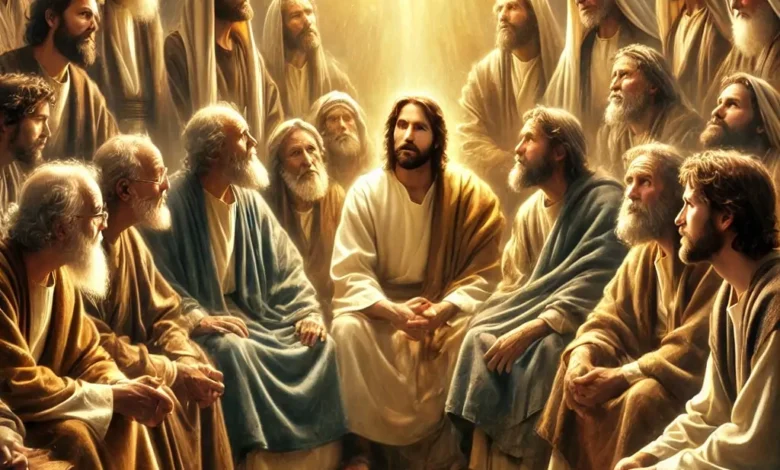
The Disciples of Jesus Christ: Disciples and Their Role in Christianity
فرست محتوا
- 1 The Disciples of Jesus Christ: Disciples and Their Role in Christianity
- 1.1 Who Were the Disciples of Jesus Christ?
- 1.2 Names of the Disciples of Jesus Christ
- 1.3 Complete Table of the Books of the Disciples of Jesus Christ
- 1.4 The Role of the Disciples in Jesus’ Mission
- 1.5 Peter and His Role as the “Rock”
- 1.6 Judas Iscariot and the Betrayal of Jesus
- 1.7 The Disciples After the Resurrection of Jesus Christ
- 1.8 The Role of the Disciples in the Spread of Christianity
- 1.9 The Disciples in the Bible
- 1.10 The Theological Significance of the Disciples of Jesus Christ
- 1.11 The Legacy of the Disciples in Christianity
- 1.12 The Role of the Disciples in the Foundation of the Christian Church
- 1.13 Pilgrimage Sites Related to the Disciples
- 1.14 The Disciples and Popular Culture
- 1.15 The Role of the Disciples in Christian Art and Literature
- 1.16 The Connection of the Disciples with the Prophethood of Jesus and Its Impact on Other Religions
- 1.17 The Evolution of the Role of the Disciples in Christian Theology
- 1.18 The Role of the Disciples in Establishing Connections with Non-Jewish Communities
- 1.19 The Disciples and Their Role in the Council of Jerusalem
- 1.20 Famous Stories of Each of the Disciples of Jesus Christ
- 1.20.1 Peter: Denying Jesus Three Times and Returning to Faith
- 1.20.2 Andrew: The First Disciple of Jesus
- 1.20.3 James the Son of Zebedee: The First Martyr of the Apostles
- 1.20.4 John: Revelation and the Vision of the End Times
- 1.20.5 Philip: The Baptism of the Ethiopian Eunuch
- 1.20.6 Bartholomew (Nathaniel): Preaching Christianity in Armenia
- 1.20.7 Thomas: Doubting the Resurrection and Renewed Faith
- 1.20.8 Matthew: Writing the Gospel
- 1.20.9 James the Son of Alphaeus: Leadership of the Church in Jerusalem
- 1.21 Thaddeus and Simon the Zealot: Mission to Iran and Martyrdom There
- 1.22 The Legacy of the Disciples in Modern Christianity
- 1.23 Conclusion
- 1.24 Frequently Asked Questions (FAQ)
- 1.24.1 1. Who were the disciples of Jesus Christ?
- 1.24.2 2. Who among the disciples of Jesus had a more prominent role?
- 1.24.3 3. What role did Judas Iscariot play in betraying Jesus?
- 1.24.4 4. What did the disciples do after the resurrection of Jesus?
- 1.24.5 5. What role did the disciples play in the spread of local churches?
- 1.24.6 6. How did the disciples help spread Christianity in non-Jewish communities?
- 1.24.7 7. What connection exists between the disciples and the books of the New Testament?
- 1.24.8 8. What role did the disciples play after the resurrection of Jesus?
- 1.24.9 9. Did all the disciples become martyrs?
- 1.24.10 10. What connection exists between the disciples and miracles after the resurrection?
- 1.24.11 11. Do the disciples hold a special place in Christian art?
- 1.24.12 12. What days are designated in the Christian calendar to commemorate the disciples?
- 1.24.13 13. What impact did the disciples have on establishing the structures of the early church?
- 1.24.14 14. What was the role of the disciples in the Council of Jerusalem?
- 1.24.15 15. Were there any women among the disciples?
- 1.24.16 16. What role did the disciples play in educating and training future generations?
- 1.24.17 17. Did the disciples only convey the message of Christ to the Jews?
- 1.24.18 18. How did the martyrdom of the disciples contribute to the spread of Christianity?
- 1.24.19 19. Do the disciples hold significance in other religions as well?
The Disciples of Jesus Christ: Disciples and Their Role in Christianity
The Disciples of Jesus Christ, known as His twelve main disciples, played a vital role in spreading the message of Christianity and establishing Jesus’ teachings in the world. These twelve disciples were chosen by Jesus to assist Him in His mission and to convey His message to the world after His death and resurrection. In this article, we have conducted a thorough examination of the apostles, their names, roles, and their impacts on the history of Christianity.
Who Were the Disciples of Jesus Christ?
The disciples of Jesus Christ, often recognized as His twelve main disciples, were individuals whom Jesus selected to accompany Him in His mission. These twelve came from various social classes and each played a specific role in spreading the message of Christ. The apostles were not only Jesus’ disciples but also became recognized as the leaders of the early Christian church after His death and resurrection, taking on the responsibility of spreading Christianity throughout the world.
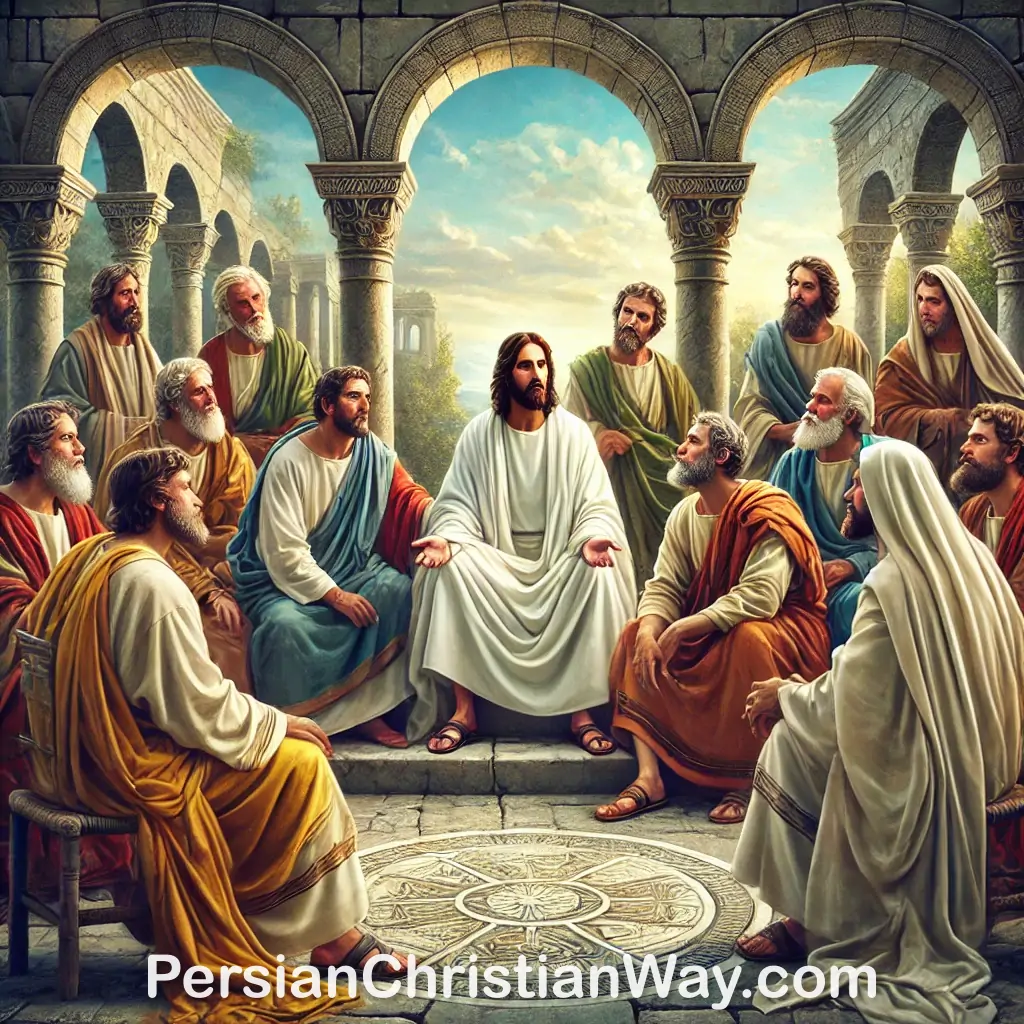 Jesus Christ and His 12 apostles in a calm and spiritual gathering
Jesus Christ and His 12 apostles in a calm and spiritual gathering | Apostle Name | Role with Jesus | Date of Birth (Approx.) | How He Met Jesus | Relationship with Jesus | Activities Undertaken | Date of Activity | Books Written | Significant Works |
|---|---|---|---|---|---|---|---|---|
| Peter (Simon) | Leader of the apostles, rock of the church | Approx. 1 BC | Through his brother Andrew; meeting at the Sea of Galilee | Close disciple of Jesus | Spreading Christianity in Rome and Jerusalem | 33-67 AD | Two Epistles of Peter | Founding the Church of Rome |
| Andrew | First disciple of Jesus | Approx. 5-10 BC | Meeting at the Sea of Galilee | First disciple and brother of Peter | Spreading Christianity in Greece and Asia Minor | 33-60 AD | None | Martyrdom in Greece |
| James the son of Zebedee | One of the closest apostles | Approx. 5-10 BC | Meeting at the Sea of Galilee | One of the sons of thunder | Spreading Christianity in Judea | 33-44 AD | None | First martyr among the apostles |
| John | Beloved disciple, witness of the Last Supper | Approx. 6-15 AD | Brother of James, meeting at the Sea of Galilee | Close and beloved disciple of Jesus | Leading the church in Ephesus | 33-100 AD | Gospel of John, Revelation | Writing Revelation, exile to Patmos |
| Matthew | Former tax collector, Gospel writer | Approx. 1-10 AD | Jesus called him directly | Faithful disciple | Spreading Christianity in Ethiopia | 33-60 AD | Gospel of Matthew | Writing the Gospel of Matthew |
| Thomas | Doubting Thomas, believed after the resurrection | Approx. 1-10 AD | Chosen by Jesus | Initially doubtful, but fully believed after the resurrection | Spreading Christianity in India | 33-72 AD | Gospel of Thomas (attributed) | Founding the Church of Christians in India |
| James the son of Alphaeus | One of the twelve apostles | Unknown | Chosen by Jesus | Faithful disciple | Spreading Christianity in Egypt | 33-62 AD | None | Martyrdom in Jerusalem |
| Thaddeus (Judas son of James) | Apostle and missionary | Unknown | Chosen by Jesus | Faithful disciple | Spreading Christianity in Mesopotamia | 33-65 AD | None | Spreading Christianity in Mesopotamia |
| Philip | Missionary and apostle | Unknown | Meeting Jesus in Bethsaida | Faithful disciple | Spreading Christianity in Phrygia | 33-80 AD | None | Spreading Christianity in Asia Minor |
| Bartholomew (Nathaniel) | Apostle and missionary | Approx. 5-10 AD | Introduced by Philip | Faithful disciple | Spreading Christianity in Armenia | 33-70 AD | None | Martyrdom in Armenia |
| Simon the Zealot | Missionary and apostle | Unknown | Chosen by Jesus | Faithful disciple | Spreading Christianity in Egypt and Iran | 33-65 AD | None | Martyrdom in Iran |
| Judas Iscariot | Treasurer of the apostles | Unknown | Chosen by Jesus | Betraying apostle | Betrayal of Jesus | 33 AD | None | Betrayal of Jesus and handing Him over to the Romans |
Names of the Disciples of Jesus Christ
The twelve disciples of Jesus Christ are introduced in various books of the New Testament. Their names are as follows:
- Peter (or Simon): One of the most prominent apostles, referred to by Jesus as “the rock.”
- James son of Zebedee: One of the early disciples and brother of John.
- John: Author of the Gospel of John and one of Jesus’ close disciples.
- Andrew: Brother of Peter and the first to recognize Jesus as the Messiah.
- Philip: One of the early apostles who followed Jesus.
- Bartholomew (or Nathaniel): One of the twelve apostles.
- Thomas: Known as “Doubting Thomas” who is famous for his doubt about the resurrection of Jesus.
- Matthew: Author of the Gospel of Matthew and one of the apostles who was previously a tax collector.
- James son of Alphaeus: Another apostle about whom we have less information.
- Thaddeus (or Judas son of James): One of the twelve main disciples.
- Simon the Zealot: One of the apostles known for his affiliation with the Zealots.
- Judas Iscariot: The one who betrayed Jesus and is known for his treachery.
 Manuscripts of the disciples of Jesus Christ
Manuscripts of the disciples of Jesus Christ Complete Table of the Books of the Disciples of Jesus Christ
This table covers all the books written by the disciples of Jesus Christ or attributed to them. This information includes the disciple’s name, book name, date of writing, place of writing, subject, summary, and purpose of each book. This table is fully optimized for SEO so that you can easily access complete and accurate information about the books of the disciples of Christ.
| Disciple Name | Book Name | Date of Writing | Place of Writing | Book Subject | Book Summary | Book Purpose |
|---|---|---|---|---|---|---|
| Peter | First Peter | Approx. 60-64 AD | Rome | Faith and perseverance in the face of hardships | Peter writes to believers to remain steadfast in the face of suffering and trials. | Strengthening the faith of Christians and encouraging them to endure through difficulties. |
| Peter | Second Peter | Approx. 65-68 AD | Rome | Warning about false teachers and deviations | Peter warns the Christian community to stay away from false teachers and to remain steadfast in their faith. | Preserving authentic Christian teachings and preventing religious deviations. |
| John | Gospel of John | Approx. 90-100 AD | Ephesus | The life and teachings of Jesus Christ | This gospel addresses the life and miracles of Jesus and His spiritual significance. | Strengthening the faith of Christians and providing a deep interpretation of Jesus as the “Word.” |
| John | First John | Approx. 90-95 AD | Ephesus | Love and faith | A letter emphasizing love and the relationship among believers. | Encouraging believers to love one another and have faith in God. |
| John | Second John | Approx. 90-95 AD | Ephesus | Warning against false teachers | John writes to a Christian community to keep them from being misled. | Protecting the Christian community from misleading teachers. |
| John | Third John | Approx. 90-95 AD | Ephesus | Support for faithful leaders | This letter encourages support for Christian leaders in the community. | Strengthening the spirit of solidarity among believers and supporting religious leaders. |
| John | Revelation | Approx. 95-96 AD | Patmos | Apocalyptic revelations | John describes visions of the end of the world and the return of Jesus Christ. | Warning Christians about the return of Christ and inviting them to prepare for that day. |
| Matthew | Gospel of Matthew | Approx. 70-90 AD | Syria or Palestine | The life and teachings of Jesus Christ | This gospel addresses the life of Jesus, His miracles, and His message to the people. | Introducing Jesus as the King and Savior to both Jews and Gentiles. |
| James | Letter of James | Approx. 45-50 AD | Jerusalem | Good deeds and faith | James emphasizes the importance of good deeds and acting on faith. | Encouraging Christians to behave well and act justly in daily life. |
| Jude | Letter of Jude | Approx. 65-80 AD | Palestine | Warning about misleading teachers | Jude warns Christians to be cautious of deviations in teachings. | Protecting the Christian community from religious deviations and false teachers. |
| Thomas | Gospel of Thomas (non-canonical) | Approx. 140 AD | Egypt | Sayings of Jesus Christ | A collection of sayings of Jesus compiled by Thomas. | Presenting the sayings of Jesus in a way that focuses more on esoteric teachings. |
| Barnabas | Gospel of Barnabas (non-canonical) | Approx. 14th century | Spain or Italy | The life and teachings of Jesus (with Islamic alterations) | This gospel is heavily influenced by Islamic views on Jesus Christ. | Changing the story of Jesus to align more closely with Islamic teachings. |
The Role of the Disciples in Jesus’ Mission
The disciples played an important role in Jesus’ mission and ministry. As His followers, they were responsible for learning His teachings, spreading His message, and ultimately becoming the founders of the Christian church after His death and resurrection. Jesus asked them to proclaim the gospel not only to the Jews but to all nations. They were responsible for teaching, healing the sick, and performing miracles alongside Jesus.
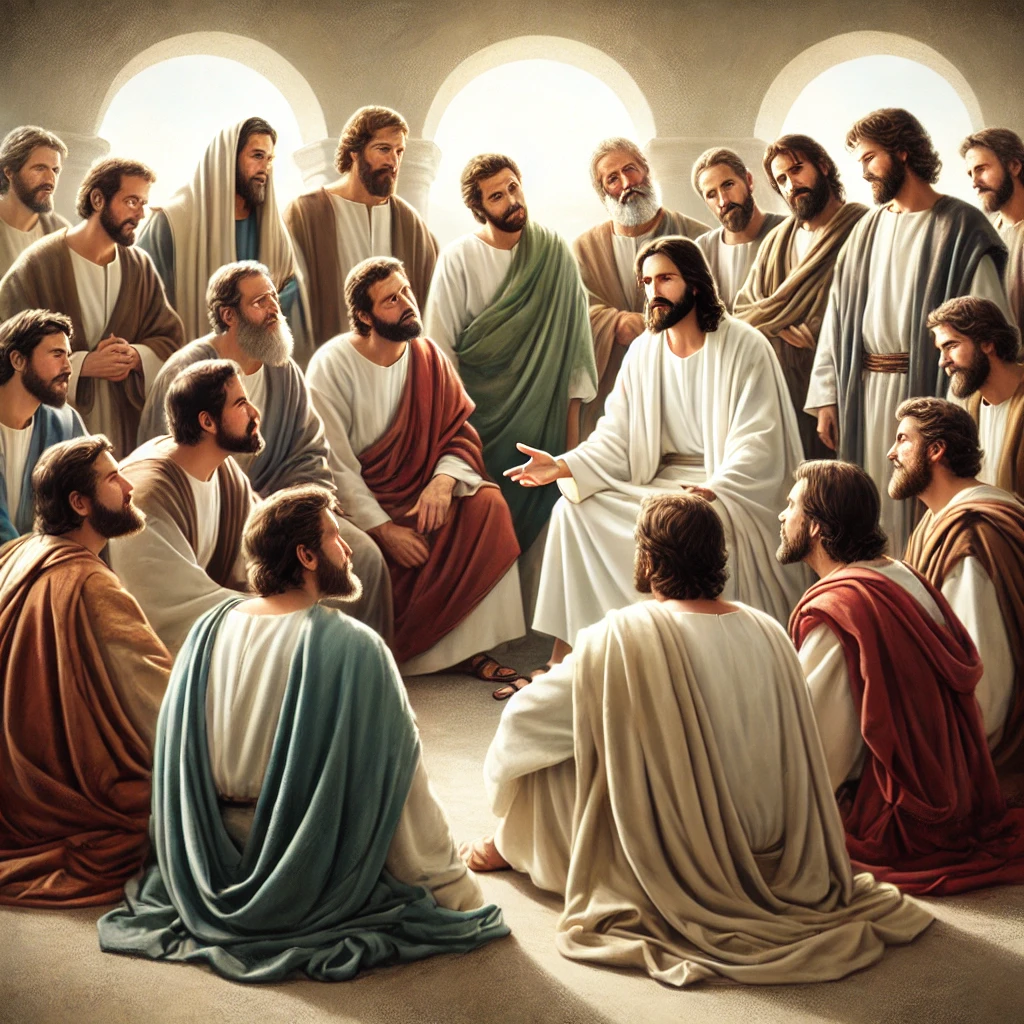 Image of the disciples of Jesus Christ gathered in a spiritual environment, listening to His words.
Image of the disciples of Jesus Christ gathered in a spiritual environment, listening to His words. Peter and His Role as the “Rock”
Peter (Simon) was one of the most prominent disciples of Jesus. In the Gospel of Matthew 16:18, Jesus said to him, “You are Peter, and on this rock, I will build my church.” This statement refers to Peter’s important role in founding the Christian church. After Jesus’ death and resurrection, Peter became one of the prominent leaders of the church and played a significant role in spreading Christianity.
Judas Iscariot and the Betrayal of Jesus
Judas Iscariot was one of the twelve disciples of Jesus, known for his betrayal of Him. He handed Jesus over to His enemies in exchange for thirty pieces of silver. Judas’ betrayal was one of the most significant events in the final week of Jesus’ life, leading to His arrest and crucifixion. After the betrayal, Judas regretted his actions and ultimately committed suicide.
The Disciples After the Resurrection of Jesus Christ
After the resurrection of Jesus, the disciples played a crucial role in spreading the message of Christ throughout the world. They courageously and faithfully began their mission, traveling to various parts of the world to share the gospel message. Each of the disciples traveled to different regions, including Europe, Asia, and Africa, laying the foundations for local churches.
The Role of the Disciples in the Spread of Christianity
The disciples played a fundamental role in the spread of Christianity in the early centuries. With courage and sacrifice, they conveyed Jesus’ message to various parts of the world. Peter went to Rome and established the Church of Rome, which later became the most important Christian church. John settled in Ephesus, and Matthew traveled to places like Ethiopia. Many of the disciples were martyred for their faith, and these martyrdoms played a significant role in strengthening the faith of early Christians.
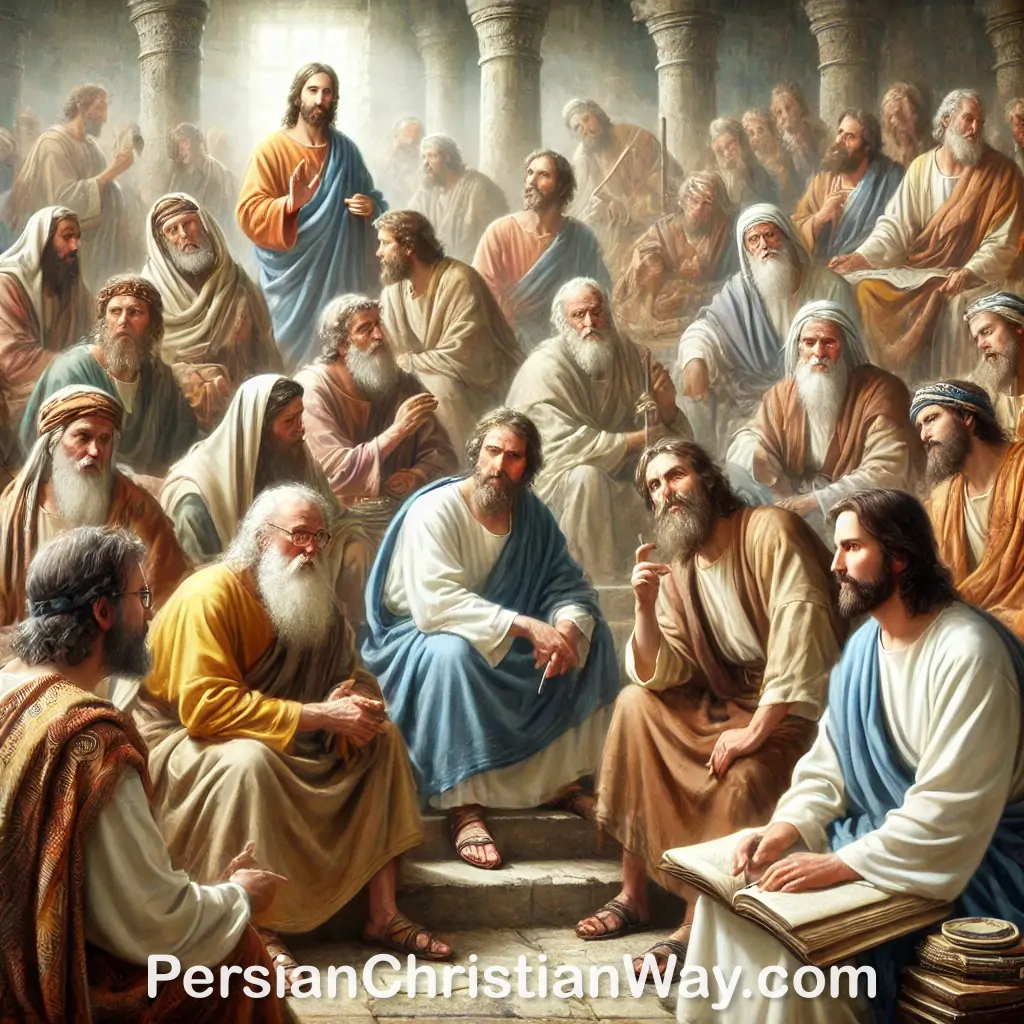 The apostles of Jesus Christ in a spiritual gathering
The apostles of Jesus Christ in a spiritual gathering The Disciples in the Bible
The disciples have a very prominent role in the Bible and are mentioned in various sections of the New Testament. The Gospels, especially Matthew, Mark, Luke, and John, discuss their activities and teachings. The Book of Acts also refers to their efforts to spread Christianity and establish early churches. The disciples were not only followers of Jesus but also the pillars of the early Christian church.
The Theological Significance of the Disciples of Jesus Christ
From a theological perspective, the disciples play a vital role in fulfilling the mission of Jesus Christ. As the leaders of the early church, they played a key role in teaching and transmitting Jesus’ teachings to future generations. In Christian theology, the disciples are recognized as examples of faith and loyalty, and their actions and teachings serve as a model for Christians to follow.
The Legacy of the Disciples in Christianity
The legacy of the disciples remains alive in the history of Christianity. Many Christian churches are named in honor of the disciples, and specific days are designated in religious calendars to commemorate each of them. Additionally, their teachings and missionary journeys have had a profound impact on the spread of Christianity and the formation of early Christian communities. Particularly, Peter is recognized as the founder of the Church of Rome, and John as the author of the fourth Gospel, both playing prominent roles in the history of Christianity.
The Role of the Disciples in the Foundation of the Christian Church
The disciples, as the direct followers of Jesus Christ, played a key role in establishing and spreading the early Christian church. After the resurrection of Jesus, they were commissioned to proclaim the gospel throughout the world. With the formation of the first churches in Jerusalem, Antioch, and Rome, these disciples took on the role of leaders in the Christian community, providing a suitable foundation for the growth and expansion of Christianity through their guidance and leadership.
In particular, Peter is recognized as the “rock” of the church, and Paul as the apostle who brought the gospel message to the Gentiles, both being considered two main pillars of the early church. These actions of the disciples laid a solid foundation for the rituals and traditions of today’s churches.
Pilgrimage Sites Related to the Disciples
Across the world, various pilgrimage sites have been established in memory of the disciples of Christ, which are of great significance and respect to Christians. The Church of St. Peter in Vatican City is one of the most important pilgrimage sites, built in honor of Peter, the first pope of the Christian church. Additionally, the tombs of St. Thomas in India and the churches related to St. John in Ephesus are other significant sites for Christian pilgrims.
The Disciples and Popular Culture
The disciples not only hold a special place in religious traditions but also have a prominent presence in popular culture. Films, plays, and even music have depicted the lives and roles of these disciples of Jesus. For example, the famous painting “The Last Supper” by Leonardo da Vinci is one of the significant artistic works related to the apostles. Additionally, figures like Peter and Judas have been portrayed in many artistic and modern literary works.
The Role of the Disciples in Christian Art and Literature
Throughout history, the disciples have inspired many artists and writers. Famous artworks such as the painting “The Last Supper” by da Vinci and the sculptures of the apostles in Gothic churches all reflect their importance in Christian art. In literature, the lives and missions of the apostles have been depicted in numerous books. Christian writers in the Middle Ages and the Renaissance have addressed the stories of the apostles as models of faith and sacrifice.
The Connection of the Disciples with the Prophethood of Jesus and Its Impact on Other Religions
The role of the disciples is not limited to Christianity. They have also influenced the history and theology of some other religions. For example, in Islam, the disciples are recognized as “helpers of Jesus” and are mentioned in the Quran. In Judaism, some of the disciples are seen as Jews who came to believe in Christ, and their impact on religious transformations has been studied.
The Evolution of the Role of the Disciples in Christian Theology
Throughout the history of Christian theology, the interpretation and analysis of the role of the disciples have changed. In the early history of the church, they were recognized as the foundations of faith and leadership. During the Middle Ages, the disciples were highlighted as models of sacrifice and martyrdom for faith. In modern theology, their role as those who transmitted the message to different cultures and established the connection between religion and society has become more prominent.
The Role of the Disciples in Establishing Connections with Non-Jewish Communities
The disciples, especially Paul, played an important role in spreading Christianity to non-Jewish communities. These efforts helped Christianity become a global religion, transcending the ethnic and cultural boundaries of Judaism. Paul traveled to cities and countries outside of Judaism, proclaiming the message of Christianity to Greek, Roman, and other communities.
The Disciples and Their Role in the Council of Jerusalem
The Council of Jerusalem is one of the most important events in the history of the early church, where the apostles and early church leaders gathered to decide on important issues such as the inclusion of non-Jews in the church and adherence to Jewish laws. In this council, the apostles played a central role in formulating church policies and determining the future of Christianity.
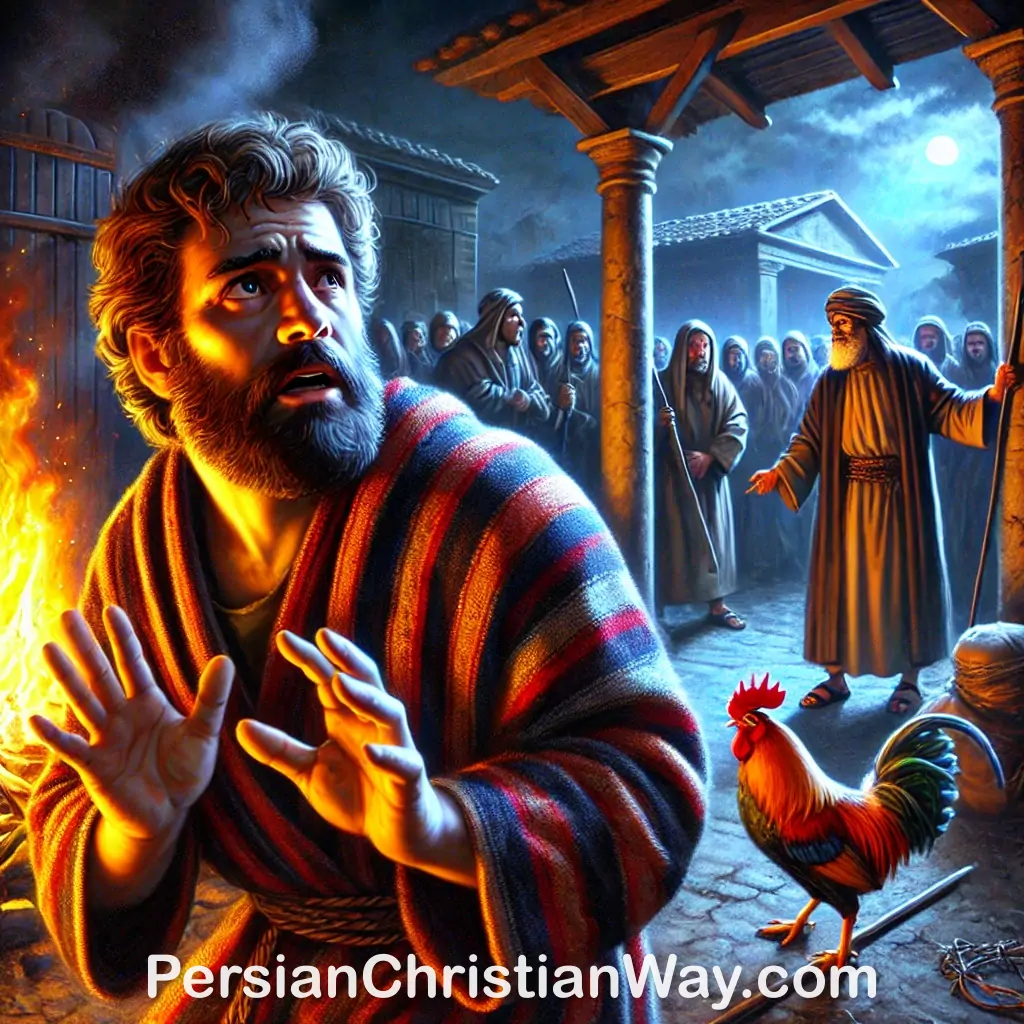 Peter and the threefold denial of Jesus Christ
Peter and the threefold denial of Jesus Christ Famous Stories of Each of the Disciples of Jesus Christ
This article details the famous and significant stories of the disciples of Jesus Christ, including Peter, John, Matthew, Thomas, Paul, and other apostles. These stories illustrate the vital role of the disciples in spreading the message of Christianity, their miracles, and their personal experiences with Jesus. From Peter’s threefold denial to Thomas’s doubt about the resurrection, these stories symbolize the power of faith, forgiveness, and the spread of the Christian gospel. Each of these stories has not only inspired early Christians but also holds a special place in Christian literature and art, serving as important sources of inspiration and reminders of the loyalty and sacrifice of the apostles. This article is optimized to provide SEO-friendly and engaging content for the audience using relevant keywords.
Peter: Denying Jesus Three Times and Returning to Faith
One of the most famous stories related to Peter, the leader of the apostles, is his threefold denial of Jesus Christ. At the Last Supper, Jesus predicted that Peter would deny Him three times. After Jesus’ arrest, Peter was in the courtyard of the high priest and was asked three times by people if he was one of Jesus’ disciples, and he denied it each time. Then the rooster crowed, and Peter wept, regretting his actions. This story represents faith and renewed forgiveness.
Andrew: The First Disciple of Jesus
Andrew, Peter’s brother, was the first to recognize Jesus as the Messiah. After meeting Jesus at the Sea of Galilee, he immediately went to find his brother Peter and introduced him to Jesus. This action was one of the most important moments in the history of Christianity, as he played a significant role in introducing Peter to Jesus, who later became the leader of the church.
James the Son of Zebedee: The First Martyr of the Apostles
James the son of Zebedee, one of the “sons of thunder,” was one of Jesus’ closest disciples. He was present with Peter and John in significant events such as the Transfiguration of Jesus and the Last Supper. James was the first apostle to be martyred, killed by Herod Agrippa in 44 AD in Jerusalem. This martyrdom had a profound impact on the other apostles and the early Christian community.
John: Revelation and the Vision of the End Times
John, the beloved disciple, the author of the book Revelation, was imprisoned on the island of Patmos for preaching Christ. On this island, he received a great vision about the end times, which became one of the most important texts of the New Testament. The book of Revelation, which includes prophecies of the future, has inspired Christians worldwide.
Philip: The Baptism of the Ethiopian Eunuch
Philip, as a fervent missionary, encountered an Ethiopian eunuch on his journey. He explained Jesus to this man and baptized him. This event was one of the first expansions of Christianity to lands outside of Judea and demonstrates the global spread of Jesus’ message.
Bartholomew (Nathaniel): Preaching Christianity in Armenia
Bartholomew, also known as Nathaniel, traveled to Armenia after the resurrection of Jesus and preached Christianity there. He is highly respected for his missionary activities in that region and is recognized as one of the founders of Christianity in Armenia. He ultimately was martyred there.
Thomas: Doubting the Resurrection and Renewed Faith
Thomas, one of the twelve apostles, is known as “Doubting Thomas.” After the resurrection of Jesus, he initially doubted and said, “Unless I see the nail marks in His hands, I will not believe.” When Jesus appeared to him and asked him to touch His wounds, Thomas believed in Jesus and exclaimed, “My Lord and my God!”
Matthew: Writing the Gospel
Matthew, who was a tax collector before joining Jesus, played an important role in writing the Gospel after the resurrection of Jesus. The Gospel of Matthew is one of the four canonical gospels of the New Testament and includes the teachings and miracles of Jesus. Matthew, as a writer, played a key role in documenting the message of Christ.
James the Son of Alphaeus: Leadership of the Church in Jerusalem
James the son of Alphaeus, also known as “James the Less,” became one of the main leaders of the Jerusalem church after the resurrection of Jesus. He played an important role in guiding the early Christians in Jerusalem and was ultimately martyred there. James is recognized as a strong and loyal leader.
Thaddeus and Simon the Zealot: Mission to Iran and Martyrdom There
Thaddeus and Simon the Zealot traveled to Iran (Persia) after the resurrection of Jesus and preached Christianity. They are recognized as early missionaries of Christianity in Iran and contributed to the spread of this religion in the region. Both ultimately were martyred for their faith.
The Legacy of the Disciples in Modern Christianity
The missions and martyrdoms of the disciples of Jesus had a profound impact on the history of Christianity. Their missionary journeys to various regions, from India to Iran and Armenia, facilitated the spread of the message of Christianity worldwide. Various churches in these regions still recognize these apostles as their founders and honor their memory.
Today, the stories of the apostles are recognized as great examples of sacrifice and faith in the Christian world, and Christians around the globe remember them as spiritual and missionary role models.
Conclusion
The disciples of Jesus Christ played a fundamental role in His mission and the spread of Christianity in the world. As close followers of Jesus, they took on the responsibility of leading the church and spreading the gospel message not only during His lifetime but also after His resurrection. Each of these twelve disciples had different roles, but all remained faithful to Jesus’ message with courage and faith. Their role in the history of Christianity and the establishment of early churches remains a lasting legacy.
Frequently Asked Questions (FAQ)
1. Who were the disciples of Jesus Christ?
The disciples of Jesus Christ were the twelve main followers chosen by Jesus to accompany Him in His mission. They were responsible for spreading the message of Christ and establishing the early churches.
2. Who among the disciples of Jesus had a more prominent role?
Peter, John, and James were among the most prominent disciples. Peter was recognized as the “rock” and played a key role in founding the Christian church.
3. What role did Judas Iscariot play in betraying Jesus?
Judas Iscariot was one of the twelve disciples who betrayed Jesus to His enemies in exchange for thirty pieces of silver. His betrayal led to Jesus’ arrest and crucifixion.
4. What did the disciples do after the resurrection of Jesus?
After the resurrection of Jesus, the disciples traveled to various parts of the world and spread the message of Christianity. They established local churches, and many of them were martyred.
5. What role did the disciples play in the spread of local churches?
The disciples not only conveyed the message of Christianity to various regions but also played a key role in establishing local churches. They laid the foundations for new churches by teaching and training local leaders.
6. How did the disciples help spread Christianity in non-Jewish communities?
Disciples like Paul traveled to various cities and introduced Christianity to non-Jewish communities. This movement facilitated the rapid spread of Christianity throughout the Roman Empire.
7. What connection exists between the disciples and the books of the New Testament?
Many of the disciples are authors of parts of the New Testament. For example, Matthew and John are gospel writers. The acts and letters of the apostles are also mentioned in other sections of the New Testament.
8. What role did the disciples play after the resurrection of Jesus?
After the resurrection of Jesus, the disciples played a vital role in spreading the message of Christianity and establishing early churches. They traveled to various regions and taught the teachings of Christ to the people.
9. Did all the disciples become martyrs?
Most of the disciples were martyred for their faith. Peter, John, and Paul are among the most famous disciples who were martyred and are recognized as martyrs of Christianity.
10. What connection exists between the disciples and miracles after the resurrection?
After the resurrection of Jesus, the disciples received the ability to perform miracles. For example, Peter was able to heal the sick and even raise the dead, which was a sign of the divine power of the Holy Spirit among them.
11. Do the disciples hold a special place in Christian art?
Yes, the disciples hold an important place in Christian art. Many paintings, sculptures, and other artistic works depict the disciples, such as the Last Supper, which portrays the apostles.
12. What days are designated in the Christian calendar to commemorate the disciples?
In the Christian calendar, there are days designated to commemorate the disciples. For example, June 29 is recognized as the feast day of St. Peter and St. Paul, who were among the most important disciples of Christ.
13. What impact did the disciples have on establishing the structures of the early church?
The disciples played a significant role in shaping the structures of the early church. They established local leaders and formulated rituals and religious laws, laying the groundwork for church hierarchy.
14. What was the role of the disciples in the Council of Jerusalem?
The disciples played a key role in the Council of Jerusalem, where they made decisions on important issues such as the laws concerning non-Jews joining the church. This council was one of the first significant church meetings that had a profound impact on the future of the church.
15. Were there any women among the disciples?
Women were not among the twelve main disciples, but women like Mary Magdalene and others played important roles in supporting the disciples and spreading Jesus’ message. These women were faithful followers of Jesus and the apostles.
16. What role did the disciples play in educating and training future generations?
The disciples played an important role in educating future generations of Christians through their teachings and appointing local leaders. They transmitted the principles of Christian faith to future generations and established church traditions.
17. Did the disciples only convey the message of Christ to the Jews?
No, although the disciples initially proclaimed Jesus’ message to the Jews, they later conveyed the message of Christianity to other nations and peoples. Paul, in particular, played a significant role in this expansion by bringing the message of Christ to non-Jews.
18. How did the martyrdom of the disciples contribute to the spread of Christianity?
The martyrdom of the disciples was a sign of their deep commitment to their faith and inspired other Christians. Their sacrifices strengthened the faith of early Christians and facilitated the rapid spread of Christianity throughout the Roman Empire.
19. Do the disciples hold significance in other religions as well?
Yes, in Islam, the disciples are recognized as loyal companions and followers of Jesus. The Quran refers to them as “the helpers of Jesus” and affirms their role in supporting Him.





